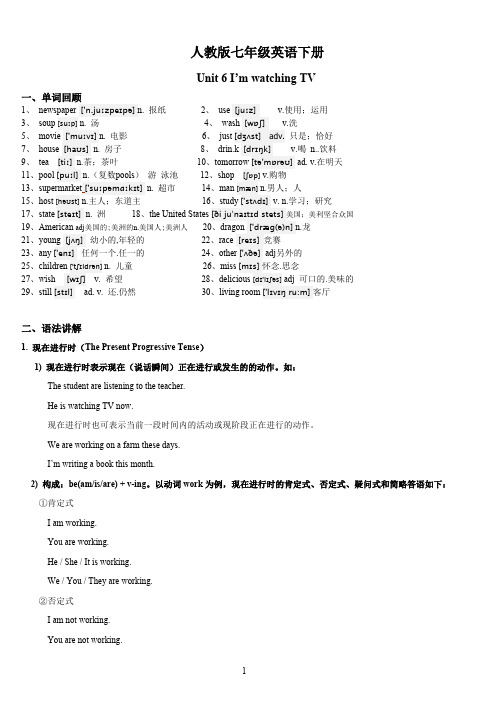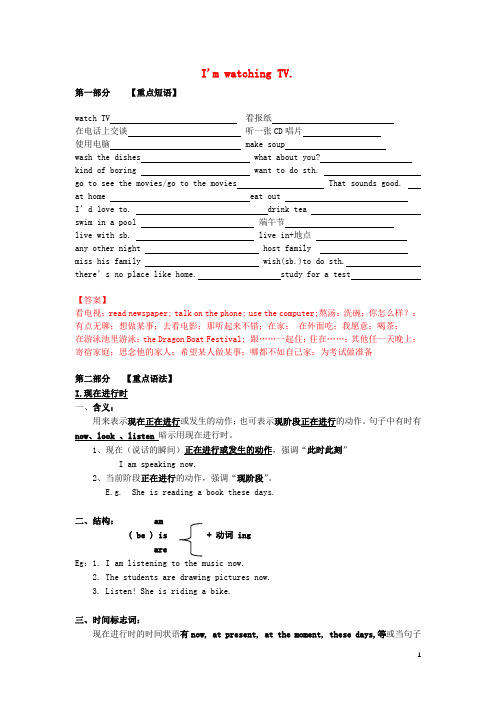七年级英语下册Unit6I27mwatchingTV知识点总结
新目标英语七下unit 6 I'm watching TV必背知识点重点短语和句子

Unit6重点短语和句子重点短语1、打扫房子clean the house2、看报纸read a newspaper3、在电话中交谈talk on the phone4、听CD listen to a CD5、用电脑use the computer6、做汤make soup7、洗盘子do/wash the dishes 8、没太多的事not much/ nothing much 9、很乐意I’d love to 10、与某人一起做某事join sb for sth.11、每逢星期一on Mondays 12去看电影go to the movies13、去购物go shopping 14、在超市in /at the supermarket15.在游泳池in/at the swimming pool 16、赛船the boat race17、美国the United States / the US/the USA/ America18、任何别的any other 19、房东the host family20、为考试而学习study for a test 21.希望去做wish to do重点句子1、--你正在做什么?What are you doing ?--没什么事,我只是再洗我的衣服。
Not much . I’m just washing my clothes.--你想和我一起吃晚饭吗?Do you want to join me for dinner?--我很乐意去,但是我的父母都不在家。
I’d love to .But my parents aren’t at home.2、让我们六点半在我家见。
Let’s meet at my home at half past six.3、--他们正在做作业吗?Are they doing homework now?--不是,他们正在外边锻炼。
No, they aren’t. They are exercising outside.4、她正在超市购物。
(完整版)人教版七年级英语下册unit6(详细内容)(最新整理)

人教版七年级英语下册Unit 6 I’m watching TV1、报纸2、use [juːz]v.使用;运用3、4、wash [wɒʃ]v.洗5、6、just [dʒʌst]adv.只是;恰好7、8、drin.k [drɪŋk]v.喝n..饮料9、tea 10、tomorrow [tə'mɒrəʊ] ad. v.在明天11、游泳池12、shop [ʃɒp] v.购物13、超市14、man [mæn] n.男人;人15、16、study ['stʌdɪ] v. n.学习;研究17、the United States [ði juˈnaɪtɪd stets]美国;美利坚合众国19、adj美国的;美洲的n.美国人;美洲人20、dragon ['dræg(ə)n]n.龙21、young [jʌŋ]幼小的,年轻的22、race [reɪs]竞赛23、any ['enɪ]任何一个.任一的24、other ['ʌðə] adj另外的25、children ['tʃɪldrən] n. 儿童26、miss [mɪs]怀念.思念27、wish [wɪʃ]v. 希望28、delicious [dɪ'lɪʃəs] adj 可口的.美味的29、still [stɪl]ad. v. 还.仍然30、living room ['lɪvɪŋ ru:m]客厅二、语法讲解1. 现在进行时(The Present Progressive Tense)1) 现在进行时表示现在(说话瞬间)正在进行或发生的的动作。
如:The student are listening to the teacher.He is watching TV now.现在进行时也可表示当前一段时间内的活动或现阶段正在进行的动作。
We are working on a farm these days.I’m writing a book this month.2) 构成:be(am/is/are) + v-ing。
人教新目标七年级英语下册:Unit6 I'm watching TV.知识点总结及单元测验

I'm watching TV.第一部分【重点短语】watch TV 看报纸在电话上交谈听一张CD唱片使用电脑 make soupwash the dishes what about you?kind of boring want to do sth.go to see the movies/go to the movies That sounds good. at home eat outI’d love to. drink teaswim in a pool 端午节live with sb. live in+地点any other night host familymiss his family wish(sb.)to do sth.there’s no place like home. study for a test【答案】看电视;read newspaper; talk on the phone; use the computer;熬汤;洗碗;你怎么样?;有点无聊;想做某事;去看电影;那听起来不错;在家;在外面吃;我愿意;喝茶;在游泳池里游泳;the Dragon Boat Festival; 跟……一起住;住在……;其他任一天晚上;寄宿家庭;思念他的家人;希望某人做某事;哪都不如自己家;为考试做准备第二部分【重点语法】1、现在(说话的瞬间)正在进行或发生的动作,强调“此时此刻”I am speaking now.2、当前阶段正在进行的动作,强调“现阶段”。
E.g. She is reading a book these days.二、结构: am( be ) is + 动词 ingareEg:1. I am listening to the music now.2. The students are drawing pictures now.3. Listen! She is riding a bike.三、时间标志词:现在进行时的时间状语有now, at present, at the moment, these days,等或当句子【练习】I.写出下列动词的现在分词play________ sing ________ go_________ swim _________ read________ eat write________ have________ make_______ swim _________ dance_______ live_________ ride live_______ take_________ come ________ put_________ cut run_________ sit _______showII.用所给的动词的正确形式填空1.The boy __________________ ( draw)a picture now.2. Listen!Some girls _______________ ( sing)in the classroom .3. My mother _________________ ( cook )some nice food now.4. Look . They _______________( have) an English lesson .5.They ____________(not ,water) the flowers now.6.Look! The girls ________________(dance )in the classroom .7.What is our granddaughter doing? She _________(listen ) to music.8. It’s 5 o’clock now. We _____________(have)supper now.9.______Helen____________(wash )clothes? Yes ,she is.10. What _____ you ______ ( do ) now?【答案】1.is drawing 2.are singing 3.is cooking 4.are having 5.aren’t watering6.are dancing7.is listening8.are having9.Is washing 10.are doing五、结构变型①陈述句(肯定句)主语+be(am, is, are)+现在分词,I am running.②一般疑问句Be(Am, Is, Are)+主语+现在分词,-Is he (she) listening to music?-Yes, he (she) is. / No, he (she) isn't.③特殊疑问句疑问词+be (am, is, are)+主语+现在分词,-What are you doing?-I am doing my homework.④否定句主语+be(am, is, are)+not+现在分词I am not reading English.下面以talk为例来说明其各种句式。
七年级英语下册Unit6I’mwatchingTV知识点详解素材人教新目标版(new)

Unit 6 I'm watching TV1.现在进行时态:(1)。
谓语动词:be + V-ing1).be动词要受主语影响变为am, is, are。
2).V-ing又叫现在分词。
(2)。
现在分词的构成规则如下:1)。
一般动词后直接加-ing.如:reading, watching, seeing2). 以不发音的e结尾的词去掉e再加—ing。
如: make—making write—writing3)。
以重读、闭音、单辅音字母结尾的词,双写这个辅音字母,再加—ing.如:get—getting swim—swimming put—putting run-running(3)用法:1)表示现在(说话瞬间)正在进行或发生的动作。
(不能指状态。
)2)表示现阶段正在进行,而此刻不一定在进行的动作。
(以these days为代表)3)表即将发生的动作。
这类词有:come, go, leave, arrive等,常与表将来的时间状语连用。
(4)常见标志:1)句中有:now, hear, look等。
如:He is doing his homework now.Look, what is the girl drawing?2)。
含现在进行时的问答。
如:—-Are you mending your pen? –No, I’m mending my bike。
你正在修笔吗?不,我正在修我的自行车。
3)用现在进行时回答表特殊的地点:如:——Where’s Tom?–He is washing clothes. (即在洗衣服的地方可找到他。
) 4)前句是“It's + 时间”句子。
如:It’s six o’clock now。
Jim is having supper.(5)。
现在进行时的一般疑问句及回答:一般疑问句把be动词提前;回答用Yes,主语+be或No, 主语+be+not。
如:Are you making the bed? Yes, I am.Is the girl drawing a picture? No, she isn't。
人教版七年级英语下册知识点总结:Unit 6 I’m watching TV

2014年春人教版七年级英语下册知识点总结Unit 6 I’m watching TV◆短语归纳1. watch TV 看电视2. read a newspaper 看报纸3. talk on the phone 通过电话交谈4. listen to music 听音乐5. use the computer 使用电脑6. make soup做汤7. wash the dishes =do the dishes洗餐具◆用法集萃1. —What + be+ 主语+ doing? ……正在做什么?—主语+ be + doing sth. ……正在做某事。
2. I’d love / like to do sth. 我愿意做某事。
3. any other + 可数名词单数其他任何一个……4. wish to do sth./hope to do sth 希望做某事◆典句必背1. —Why are you doing? 你在做什么?—I’m watching TV. 我在看电视。
2. —What’s she doing? 她在做什么?—She’s washing her clothes. 她在洗她的衣服。
3. —What are they doing? 他们在做什么?—They’re listening to a CD. 他们在听一张CD 唱片。
4. —Are you doing your homework? 你在做你的家庭作业吗?—Yes, I am. / No, I’m not. I’m cleaning my room.是的,我在做。
/ 不,我没有。
我在打扫我的房间。
5. Zhu Hui misses his family and wishes to have his mom’s delicious zongzi.朱辉思念他的家人并希望吃上他妈妈的可口粽子。
◆话题写作It’s seven o’clock in the evening. Kate’s family are all at home. Kate is doing her homework. Her father is reading a book. Her mother is watching TV. Her grandfather is listening to the radio and her grandmother is cleaning the room. Her sister, Betty, is playing computer games. They are all enjoying themselves.。
初中英语人教新目标七年级下册Unit 6 I’m watching TV单元知识点整理

七年级英语下册Unit6知识点【Useful expressions】1.read a newspaper/book 看报/读书2.talk on the phone 通过电话交谈3.make soup 煲汤4.wash/do/ the dishes 洗碗5.at home 在家6.eat out 外出就餐7.I'd love to=I would love /like to 我愿意/我想8.see you then. 再见9.wash the clothes 洗衣服10.make dinner 做饭11.drink tea 喝茶12.go to the movies 看电影13.think about/think of ...认为、考虑......14.live with... 和......居住在一起15.in the United States 在美国16.Dragon Boat Festival 端午节17.on TV 在电视里18.any other+可数名词单数其他任何一个19.read sth.to sb. 读......给......听20.wish to do sth 希望做......21.a lot=very much 非常22.talk show 脱口秀23.write about... 写关于......24.study for a test 复习迎考25.host family 寄宿家庭26.on the Internet 通过互联网e the computer用电脑28.Not much 没什么29.miss one’s family 想家30.at school 在学校【Target sentences】1.—What are you doing?—I’m watching TV.2.—What’s John doing?—He’s washing the dishes.3.— What are Dave and Mary doing?—They’re listening to a CD.4.— Where is he swimming?— At/In the pool.5.— Is she shopping?— Yes, she is.6.— Is he doing his homework?—No, he isn’t.7.—Are you doing your homework?—No,I'm not.I'm cleaning my room.8.Do you want to join me for dinner?9.What do you think of his home in China?10.His dad and uncle are watching the boat races on TV.11.The mother is reading a story to her young children.12.He's talking on the phone to/with his cousin in Shenzhen.13.Zhu Hui misses his family and hopes to have his mom's delicious zongzi.14.But there's still no place like homehome.15.Zhu Hui loves New York and his host family a lot.【Language points】1.He is reading a newspaper.newspaper n.报纸为可数名词,“看报纸”要用read a newspaper.【易混辨析】in the newspaper与on the newspaperLook! Your photo is in the newspaper.看!你的照片上报纸了。
七年级英语下册Unit 6 I27m watching TV 知识点总结

Unit 6 I’m watching TV一.词组、短语及用法do one’s homework做家庭作业wait for sb/sth. 等候某人/某物talk on the phone 通过电话交谈some of +宾格代词(us/you /them)我们中的一些人read a newspaper 读报纸at school 在学校at hom在家at the mall在商店listen to a CD 听CD live with sb. 与某人居住在一起go shopping=do some shopping 去购物 a photo of my family 一张我家的照片do the dishes= wash the dishes洗盘子study for an exam 为了考试而学习write a letter to sb. 给某人写信wish to do sth. 希望去做某事go to the movies 去看电影wash one’s clothes 洗衣服use the computer 用电脑drink water/tea 喝水/茶make soup 做汤clean one’s room 打扫房间talk with sb. 和某人交谈at six o’clock 在六点钟That sounds good. 那听起来不错at half past six 在六点半TV show 电视节目on weekends/weekdays 在周末/工作日join in 加入What/How about+名词/代词/doing sth. 做..怎么样?二.重点知识点讲解练习:1. Kangkang's sister _____ a book in her room.2. Please _____ the blackboard, boys and girls.3. What other things can you _____ on the table?4. _____! What are they doing under the tree?5. My brother and I are _____ TV.3. make 表示“做、制作、制造”【解析】①make sth. 意为“制作某事”E.g. make tea 沏茶make soup 做汤make the bed 铺床make friends 交朋友②make sb. sth. = make sth. for sb. 意为“为某人制作某物”E.g. I’m making my mother a cake.=I’m making a cake for my mother.4.That sounds good.那听起来不错。
人教版七年级英语下册Unit6 I’m watching TV要点详解

I’m watching TV.要点详解1.(1) What are you doing? 你在干什么?表示询问“某人正在干什么?”可用上述句型,即:What + be +主语+ doing 句型中be动词应根据主语的人称、数的变化来选择。
主语为第一人称单数用am,为第三人称单数用is,其余一律用are。
例:What is he doing? 他在于什么?What are the students doing? 学生们在于什么?(2) “be(am、is are)+doing”构成现在进行时,常用于以下几种情况:①表示现在(说话瞬间)正在进行或发生的动作。
It is raining now. 现在正在下雨.Look! He is working in the office. 看!他正在办公室工作。
②现在进行时也可表示前一段时间内的活动或现阶段正在进行的动作。
My brother is reading a story book this week.我弟弟这周正在看一本故事书。
They are working in a hospital these days. 这些天他们在医院里工作。
③也用来表示一个在最近按计划或安排要进行的动作。
(这时多用一个表示将来时间的状语)We are leaving on Friday. 我们将于星期五动身。
(3) v. +ing形式在语法上有时也称为现在分词或动名词,其构成如下:①一般情况在动词原形之后直接加-ing。
work- working go- going②以不发音的e结尾的词,去e再加-ing。
come--coming ride--riding2. Do you want to go to the movies? 你想去看电影吗?表示“电影”美国英语为movie,而英国英语中常用film。
“看电影”美国人常说go to the movies, 而英国人常说see a film或go to the cinema。
- 1、下载文档前请自行甄别文档内容的完整性,平台不提供额外的编辑、内容补充、找答案等附加服务。
- 2、"仅部分预览"的文档,不可在线预览部分如存在完整性等问题,可反馈申请退款(可完整预览的文档不适用该条件!)。
- 3、如文档侵犯您的权益,请联系客服反馈,我们会尽快为您处理(人工客服工作时间:9:00-18:30)。
Unit 6 I’m watching TV一.词组、短语及用法do one’s homework 做家庭作业wait for sb/sth. 等候某人/某物talk on the phone 通过交谈some of +宾格代词(us/you /them)我们中的一些人read a newspaper 读报纸at school 在学校at hom在家at the mall在商店listen to a CD 听CD live with sb. 与某人居住在一起a photo of my family 一我家的照片go shopping=do some shopping去购物study for an exam 为了考试而学习do the dishes= wash the dishes洗盘子write a letter to sb. 给某人写信wish to do sth. 希望去做某事go to the movies 去看电影wash one’s clothes 洗衣服use the computer 用电脑drink water/tea 喝水/茶make soup 做汤clean one’s room 打扫房间talk with sb. 和某人交谈at six o’clock 在六点钟That sounds good. 那听起来不错at half past six 在六点半TV show 电视节目on weekends/weekdays 在周末/工作日join in 加入What/How about+名词/代词/doing sth. 做..怎么样?二.重点知识点讲解2. Please _____ the blackboard, boys and girls.3. What other things can you _____ on the table?4. _____! What are they doing under the tree?5. My brother and I are _____ TV.3. make 表示“做、制作、制造”【解析】①make sth. 意为“制作某事”E.g. make tea 沏茶make soup 做汤make the bed 铺床make friends 交朋友②make sb. sth. = make sth. for sb. 意为“为某人制作某物”E.g. I’m making my mother a cake.=I’m making a cake for my mother.4.That sounds good.那听起来不错。
【解析】①类似的感官动词look, smell, feel, taste+形容词都表示“....起来...”E.g. His idea sounds good. 他的主意听起来不错。
These flowers smells very sweet. 这些花闻起来很香。
The tomatoes feels soft. 这些西红柿摸起来很软.②sound, look, smell, feel, taste like +名词都表示“...起来像某事”E.g. It sounds like the singing of the birds.5. Thanks for your letter and the photos.【解析】thanks for sth.= thanks for doing sth (thanks= thank you) 因为(做了)某事而感你E.g. Thanks/Thank you for helping me buy this book.6.want 表示“想要,想..”【解析】①want sth. 想要某事E.g. I want a pair of new shoes.②want to do sth. 想要去做某事E.g. Kankang wants to talk with his friend on the phone.③want sb. to do sth. 想要某人去做某事E.g. Her parents want her to do the dishes.e at half past six.【辨析】at表示时间的一点;in表示一个时期;on表示特殊日子。
①at后常接几点几分,天明,中午,日出,日落开始等。
at five o’clock 在五点atdown/daybreak/sunrise/sunset在黎明/天亮/日出/日落at the beginning of themonth在月初at noon 在中午at that moment 在那一刻at that time 在那时at midnight at this time of day 在一天的这个时候②in后常接年,月,上午,下午,晚上,白天,季节,世纪等。
in 2006 在2006年in May 2004 在2004年五月in the morning/afternoon/night/daytime 在上午/下午/晚上/白天In spring 在春天in a week在一周in the 21st century 在21世纪in three days/weeks/month在三天/周/个月③on后常接某日,星期几,某日或某周日的朝夕,节日等。
on Sunday 在星期日on New Year’s Eve 在除夕on that afternoon在那天下午on October 1st,1949 在1949年10月1日on a warm morning inApril 在四月的一个温暖的上午on the morning of the15th在15日的早上on a December night 在12月的一个晚上on Christmas afternoon在圣诞节下午On theweekends/weekdays在周末/工作日8. show 既可以作名词,也可以作动词①作名词,表示“节目”,如:TV show, sports show, game show, talk show②作动词,常用搭配show sb. sth. 表示“给某人看某事”E.g. Can you show me your family photo?③作动词,表示“表演”E.g. Can you show us Beijing Opera?练习:1. 我想要看一些体育节目________________________2. 你能把你的照片给我看吗?________________________9. He is living with an American family in New York. 他在纽约和一个美国家庭住在一起。
【解析】live是不及物动词后接at/in/with 表示“居住”①live at+小地点live in+点表示居住在某地E.g. She lives at a small village.That American boy lives in china.②live with sb. 和某人居住在一起E.g. Tom is living with his parents.10. family的两种用法①表示“家人”,强调“家庭成员”时,表示复数概念,谓语动词用复数形式。
②表示“家,家庭”,强调“整体”,表示是单数概念,谓语动词用单数形式。
E.g. His family is a happy family.His family are watching TV.练习:His family ___________(have) a shower. 他们家有一个淋浴。
11. Here are/is... 表示“这是...”【解析】be动词和后面的名词进行搭配,单数或不可数名词用is,复数名词用areE.g. Here are some of my photos.Here is a photo of my family.12. But there isn’t a Dragon Boat Festival in the US. 但是美国没有端午节。
【解析】There be句型表示“在某地有某人或某物”主语是单数或不可数名词,be动词用is;主语是复数,bed动词用areE.g. There is a book on the desk.There is some water in the glass.There are three men under the tree.▲There be句型的否定句:在be动词前面加not一般疑问句:把be动词放到句首E.g. There is a duck in the river.→否定句:There is not a duck in the river.→一般疑问句:Is there a duck in the river?【注】have表示“某人拥有某物”,强调所属关系,通常人作主语,主语为第三人单数时用has。
E.g. I have a lucky dog.She has some beautiful dresses.▼have/has的否定句:在have前面加上don’t或doesn’t(第三人称单数)一般疑问句:借助于助动词do/does,放在句首→否定句:I don’t have two sisters.Linda doesn’t have a nice watch.→一般疑问句:Does Linda have a nice watch?Do they have a big gardem?13. So it’s like any other night for Zhu Hui and his host family. 因此今晚对于朱辉和他的寄宿家庭来说就像其它任何一个晚上一样。
【解析1】be like 表示“像....一样”E.g. The little girl is like a angel in her new dress.在疑问句中,What is ...like用来询问特征或性格,回答时要描述特征、性格等.E.g. —What is your new neighbour like?—He is kind and friendly.【解析2】other作形容词,表示“别的,其他”E.g. Do you have any other question(s)? 你还有其他问题吗?Ask some other people. 问问别人吧!【辨析】other, the other, others, another▲the other指两个人或物中的另外一个,常常与one 连用,具体形式为one....the other E.g. He has two daughters. One is a teacher, the other is a doctore.▲the other还可作形容词,后可加单数名词,也可加复数名词。
